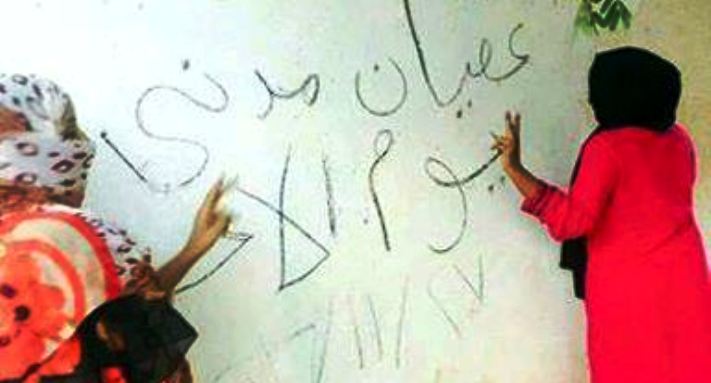Sudanese opposition parties join call for civil disobedience

November 26, 2016 (KHARTOUM) – Several opposition parties and rebel movements have declared support for the civil disobedience call initiated by political activists on social media saying directives have been issued to their members to join the call.
On Thursday, political activists launched social media campaign calling on the Sudanese people to engage in civil obedience from 27 to 29 November to resist recent government decision to lift fuel, electricity and drug price.
Also, opposition members and activists held open-air addresses at marketplaces, transportation stations and mosques in the capital Khartoum during the past couple of days urging the residents to join the civil disobedience.
In a statement extended to Sudan Tribune on Saturday, the Politburo of the Democratic Unionist Party (DUP) said 27 November would represent “the beginning of the end for the regime that governed the country by the force of arms destroyed its resources and looted its bounties”.
The statement pointed that a decision was issued to all DUP’s bodies and sectors to join the civil disobedience, saying the legal sector is ready to defend all Sudanese who face threats from the employers.
“Sunday must be the beginning, not the end of resistance and we must organize ourselves at all levels in order to cause a complete paralysis at all the country’s facilities,” read the statement.
For its part, the Sudanese Congress Party (SCoP) said the call for civil disobedience by activists comes in line with its efforts to overthrow the regime.
“SCoP praises the call for civil disobedience and considers it unrivaled success and an initiative worthy of support and we would work with our people to ensure the success of this giant move in order to overthrow the regime,” said SCoP in a statement on Saturday.
The statement described the civil disobedience as an effective tool to resist the totalitarian regimes, saying the Sudanese people have used it during the revolutions of October 1964 and April 1985.
On Friday, Sudan’s Health Minister Bahar Idris Abu Garda had downplayed the call for civil disobedience, expecting it would fail because the Sudanese people appreciate the recent economic measures taken by the government.
It is noteworthy that more than seven web pages on the social media sites have been launched to circulate the civil disobedience call. The most trending was the #Sudan_Civil_Disobedience_27Nov hashtag on Twitter which reached more than 132,130 participants.
Also, the preliminary committee of the civil disobedience issued a statement containing instructions on how the residents could participate in the campaign and ensure its success.
On the other hand, the Sudanese armed opposition also announced support for the civil disobedience call urging the Sudanese to line up in order to uproot the regime.
In a statement on Saturday, the rebel Sudan Liberation Movement (SLM-MM) led by Minni Minnawi called for overthrowing the regime through peaceful, civil or military means, stressing support for the civil disobedience call.
Also, the rebel Justice and Equality Movement (JEM) led by Gibril Ibrahim said the movement’s base would join the civil disobedience to topple the regime, calling for the unity of the opposition forces to achieve the desired goals.
For its part, the rebel umbrella Sudan Revolutionary Front (SRF) expressed unlimited support for the escalation against government austerity measures, demanding the regular forces not to engage in a confrontation with the Sudanese people.
“Your duty [as regular forces] is to maintain the safety and security of the people, not to repress them through the use of excessive violence in order to appease an unjust and despot ruler” said the SRF in a statement on Saturday
Meanwhile, the independent teachers committee said the National Intelligence and Security Services (NISS) on Saturday has arrested three teachers including Al-Shazali Mohamed Adam, Munir Mohamed Osman and Abdel-Magid Bashir.
In a statement extended to Sudan Tribune Saturday, the committee pointed the NISS continues to detain its executive office’s member Amar Youssef, saying it has also summoned three teachers including Hamdan Bolad, Tarig Maman and Ismail.
On Friday, Sudanese President Omer al-Bashir sacked the secretary general of the Sudan Pharmacy Council (SPC), Mohamed Hassan Imam, and cancelled a new list of drug price issued by the latter.
Earlier this month, Central Bank of Sudan (CBoS) announced it will no longer provide US dollar for drug importation at rate of 7,5 Sudanese pounds (SDG) forcing pharmaceutical companies to buy the dollar from the black market at 17,5 pounds.
Following the CBoS’s decision, the SPC issued a new list showing the drug price has drastically increased by 100 to 300 percent.
The decision stirred a large wave of protests across Sudan. Also, some two hundred private pharmacies in Khartoum went on partial strike and closed their doors from 09:00 am to 05:00 pm last week in protest against the government’s move.
Also, the government, earlier this month, lifted fuel subsidies and increased electricity price in a bid to stop the surge in inflation and control the fall of Sudanese pound in the black market.
The government decision led to significant increase in the general price level and exacerbated the already dire living conditions.
Sudan’s economy was hit hard since the southern part of the country declared independence in July 2011, taking with it about 75% of the country’s oil output.
(ST)
